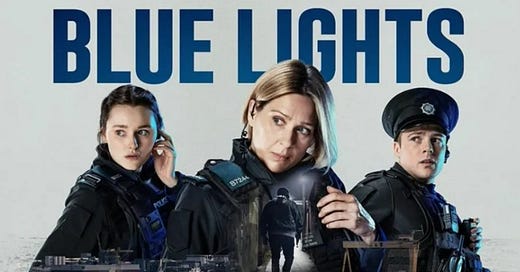Blue Lights. BBC. 2023. Six part series shines its (blue) light on the lives of three probationary constables in their first months of service as members of the Police Service of Northern Ireland.
They each have training officers to teach them the ropes, who try to keep them alive, and also show them how to follow both the written and unwritten codes of behaviour.
The series is set in Belfast, where, apparently, even sunny days are grey. Organized crime and anti-British terror groups are the largely invisible but also ubiquitous threat. The officers, all assigned to “response”, operate in neighbourhoods where they face overt hostility on almost every call, and often require back-up even for friendly visits. The mood, deftly communicated, is the pot is always simmering, and can boil over without warning, at any moment.
In each of the first two episodes we see the beginning of a constable's day. After breakfast, they head outside, and before driving to the station to suit up, they check under their personal vehicles for explosive devices or sabotage. It's a stark reminder, reinforced when one of probationary constables is followed home, that they have to always be vigilant.
In the fourth episode the son of one of the probationary constables, after being driven home by his mother and her partner in a police car, warns her not to stick around too long, in case the neighbours see her in uniform, and figure out she is a police officer.
The message is the general public not only has no respect for the profession, they actively distrust and dislike those who serve.
One training officer explains his understanding of his societal function. He tells his mentee, who is a second career cop, formerly a social worker, that he is a "bucket man" who cleans up society's shit when it spills over, patches up the tank with a little duct tape, then takes the shit away. At the end of the month he gets paid.
It's a cynical view. It makes me think about the officers I've already met, and those I will meet in coming months. How do they preserve their humanity, and capacity for vulnerability and trust?
In Blue Lights, the “blue shirts” (constables and sergeants) have each other’s back, and have low tolerance for those in their ranks who don’t. They need to be able to trust each other- on the street, and also in the station house, and within the larger organization of the police service, where there is a predictable, and disappointing amount of in-house politics.
Of the two “white shirts” we meet in the drama, one is a more than a little slimy Inspector, who abuses rank and position to have an affair with a constable under his command, and the other is a Chief Superintendent who uses her influence to fast track her daughter (the very same constable) towards a career in police administration.
In this fictional station-house, the role of conscience, moral guide, and protector falls to a sergeant who acts as direct supervisor to all the response team constables. We see her call the Inspector on his abuse of power. We also see her step around the Inspector to report inappropriate actions to the higher-ups.
This sergeant holds the team together, and I think represents the deep bonds formed amongst the serving members. It is satisfying, in the final episode, to see her promoted to Inspector, and occupying the office of her former boss, who has been forced to resign.
I’ve made an effor to tell you a lot, without giving away the story-lines. The series is absolutely worth watching.





